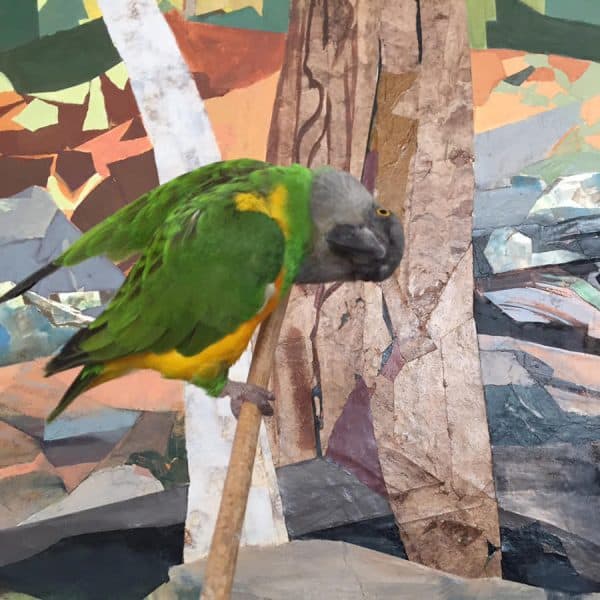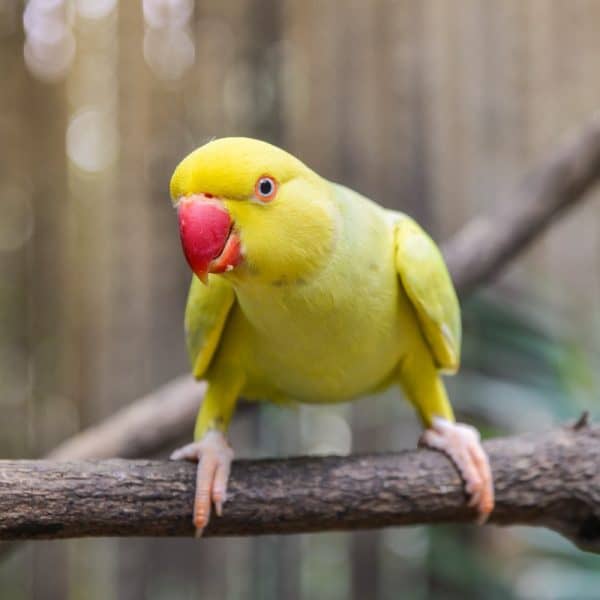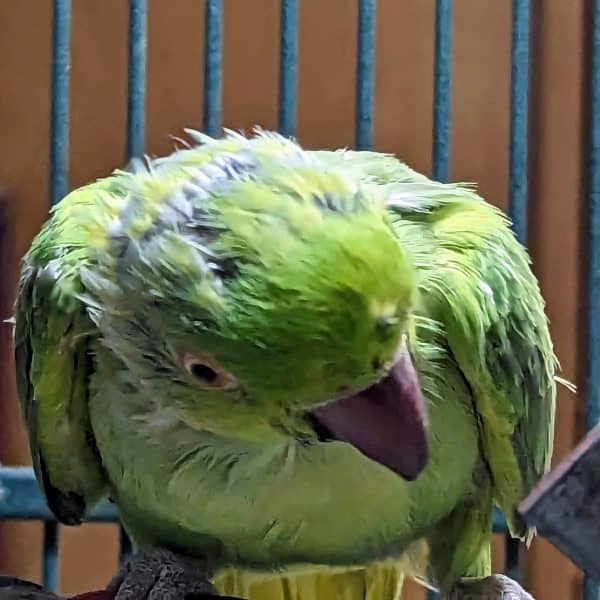Last Updated on by Mitch Rezman
Indian ringnecks aka Rose-winged parrots
Editors note: Approximately 20% of parrots are sexually dimorphic meaning sex can be determined by color. Male Eclectus parrots are green, female Eclectus are red (with good reason)
Male budgies generally have a blue cere and female’s, a brown cere. Male Indian ringnecks are the ones with the rings.
Lisa L. G
So I have some questions about IRN’s.
Now all the research I read says NOT to train them for a year as they need this time to get to know their new flock (me, the dogs, and my husband). he took to me right off the bat. My hubby, he is leery of.. like runs away. Have any tips for them to connect?
Also, I have been thinking for quite some time to introduce a mimic box, as he has started mocking the dog barking.. my research said not to teach anything until he is over a year (hatch date Aug. 10). between barking, tweeting, and screeching I am hoping you say.. just go for it!!
This is such a unique species and I assumed they were similar to cockatiels in temperament. I am quiet wrong in that assumption. So, what advice can you give me on biting, touching him.. the only time I can touch his feather is when I clip wings and nails. When I am grooming him I look at him all over with him safely wrapped in a washcloth.
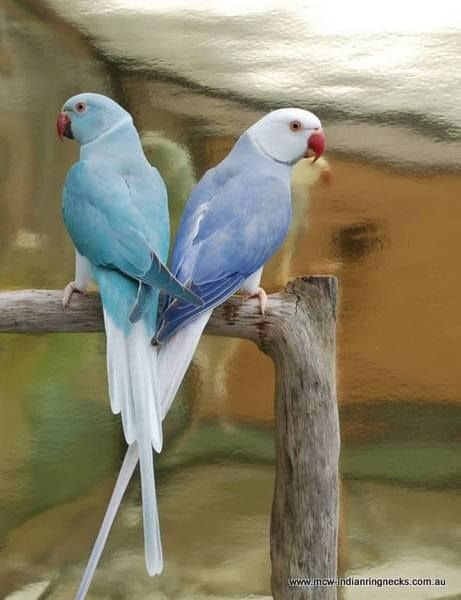
Is there anything I can do about the ear-biting? Sometimes when he is sitting on my shoulder he attacks my ear for no reason. I usually scream ouch! and give him a time out in his cage, as this worked with the ‘tiel I used to own. The IRN just seems a bit more stubborn.
He (I say this tentatively) has quite the personality otherwise. He has made friends with a dove outside and will do this “mating dance” to her, he loves to get on the floor and play with dog toys and his ball toys AND on occasion will bring them to me to toss for him (fetch).
He loves feeding the dogs. He has all the toys he could ever want and an activity center hanging from the ceiling. I am in the process of building a play stand for him. YES, he does get rewarded for good behavior.
HE IS NEVER HUMANIZED! He is a bird and gets treated as so. I never ever humanize my animals. I am a dog trainer and know how bad this is for any species.
Can you do an article on IRNs for us owners who just don’t seem to understand the species?
Thanks for the advice.
Catherine Tobsing to Lisa
Sorry for the delay. All I can say is that you received the wrong information. I had an Indian Ringneck for 20 years that I finished hand feeding as a chick and he was the best little bird.
I feel for the little guy that he has been not been given the attention he deserved from the beginning. How do you know it is a boy? Was it sexed? How old is he now?
If he was born in August then he is about 9 months old. My Ringneck was a Lutino so he was bright yellow and at about 11 months old the very first of the bright orange neck ring feathers showed up and by 18 months it was complete.
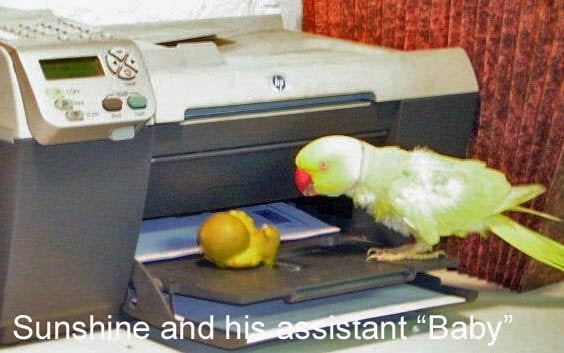
Sunshine started talking at 6 1/2 months old, He said Hello, “Love you” and “Nummy Nummy”. I realized that he was learning while I hand fed him and talked to him. I
f I knew this prior I would have talked to him much more as he was ready to talk non-stop and learned words like a sponge until he was about 3 years old when he stopped picking up new words.
Now I have been told that Ringnecks don’t bond as close as other birds but mine did. He was my little fella and he loved me.
Now what I learned later I wish I knew while I had him in the formative years. If you pet your bird, ONLY pet him from the neck up. No stroking the lower parts as it is a form of foreplay and your bird can become sexually attached to you and that is harder to deal with when you have a parrot trying to hump your toes. He became quite attached to me to the point of constantly trying to have sex with my toes and it just was not fulfilling to him.
Later in his life, I tried to get him a female but he was humanized too much and he was never able to consummate his affections, he was completely lost even though he did spend time with her, he always looked to me. Eventually, it was such an unpleasant love triangle I found her another home and let him have me alone until he passed years later of a stroke.
He did find a tiny yellow squeaky toy to be his ultimate friend and he went through over 20 of them through the years. Difficult as the toy changed style somewhat and eventually went away but I was able to supply him until he passed, clutching his “baby”.
Shoulder riding is NOT a right unless the bird does not bite, etc. He may not be able to be allowed on your shoulder ever if he continues. You may want to try to wear a birdie necklace so he has something to DO while sitting there as boredom can result in ear bites.
A 3-foot piece of plastic chain connected at the end and adorned with tied-on buttons, beads, leather bits, etc can help a lot to give him something to occupy himself while on your shoulder, but if he bites still he has to be removed. Period.
Timeouts are not quite understood, best to avoid the problem so it does not happen. If he is okay on your shoulder for 10 minutes but at 15 he starts to bite, then remove him after 10 minutes.
You can’t punish birds, you can only steer behavior.
I recommend clicker training. This is for reward. Once they learn that they can do things and get rewards they are less likely to do the negative practices.
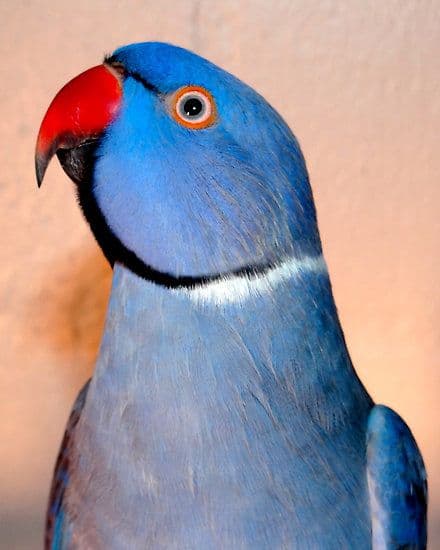
Yes, mine loved to play fetch. I would toss small plastic lattice balls and he would run for them and bring them to me to toss again. That was great fun.
I used to have to wrap him up to trim his nails or he would bite of course, but I could trim his wings with him facing my chest and spread out his wings without any problem though.
Later I let him fly as I should have from the beginning. He began to pick at his feathers for a while and broke a few blood feathers, that gets expensive to run to the vet to remove a broken blood feather and one time I came home to find him covered in blood after our Vets hours were closed.
I swallowed and grabbed him and took my chances alone and ran him under water to find the broken feather, and pulled it out with my needle-nosed pliers. He never bit me. He was the best bird I ever had.
Hope that helps
MitchR’s 2 cents
I’m glad we got Catherine’s input. I lived with her male Sunshine for 4 years and had a cockatiel for 3-1/2 years who succumbed to cancer last summer so we are intimately familiar with both species.
I have birds and raised dogs as a semi-pro for 25 years (malamutes and huskies 10 years – standard poodles 15) The best time to train any animal is now – no reason to wait –
Ringnecks can be great talkers – it’s best to work with them face to face so they can monitor your facial expressions
BlueZooBird Interview with Mark Hagen
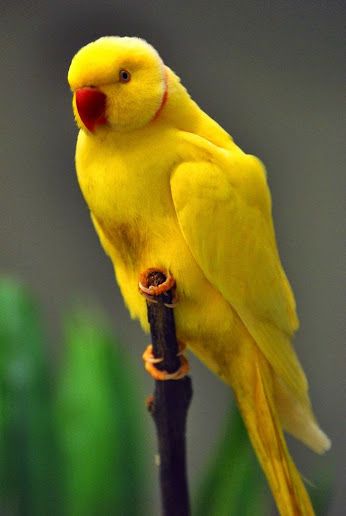
best
mitchr
I received an Indian ringneck parakeet, Maverick, (male, lavender, 11 weeks old) on my b-day, yesterday.
His sibling is still at the pet shop. Would it be good to have the two be together? Don’t know it’s gender yet.
Also, I was told if two are together, it will be difficult to teach them to talk. Is it best to keep one or two as a companionship? Do they need to be in separate cages? They were together in the pet shop.
Please advise.
It’s best to raise ringnecks solo if you are seeking a human/bird bond.
– with 2 birds you become a zookeeper. It takes about 18 months for a male’s neck rings to come in fully so you’ll need to a DNA test if you wish to know sooner.
My pleasure Kathy
Best
MitchR
Re: [email protected] sent you a message
K Mainzer replied
Big THANK YOU! Mitch on your reply.
I guess I’ve been just fueling Agni’s fire!! They are cut off from soy, but they do like limas and peas, as well as other occasional beans. I will let you know if I notice any difference in behavior.
Oddly, Boingo, who is 11, and, while he has his full wings, cannot fly due to a cat encounter, has no real interest in spring fling behavior much
He is intellectual, prefers watching parrot videos, and he is a great fan of the ringnecks on UTube.
He knows them like we know movie stars. Agni did not talk when he came to live with us and Boingo taught him all the words and songs we use. Since Agni tends to “chirp loudly” we request English. They are, in effect, both bilingual.
Boingo has anxiety issues though and will chew on his tail feathers. He has lots to chew on though and he likes to chew. His all-time favorite “game” is chewing on a beak-proof cloth with my fingers moving around underneath. The attention time with that game a few times a day has done wonders to cut down on feather chewing.
I am the parrot nanny who lives with them, and they have me all day and night, so they aren’t neglected. Respecting and tending to their individual “issues” makes for a happy flock.
Agni “chirps loudly” every day at 5 (nut time). He knows the word nut but won’t say it. If I ask if he wants a nut, he drums loudly.
He also “chirps loudly” every day at 6:30. I figured out that he is calling one of his flock homes. He’s sure it works because, sure enough, soon his flockmate walks in the door.
Learning to communicate with the parrots has been a wonderful pleasure. Thank you for helping!
Kathy
cool about the drumming Kathy
I’ve been blogging for 10 years and will continue until I am no longer able 🙂
Best MitchR
K Mainzer replied
I have 2 males, ages 9 and 11, both rescues, each very unique, due somewhat to their reasons for rescue.
I just read that soy might contribute to hormonal behavior. Agni, full-flighted, gregarious, toy lover, loves soybeans. Eat them every day with fruit and other veggies. Should I cut him off in Springtime?
Also, saw study of cockatoo drumming. Agni and Boingo are great drummers. Since they roost in the same room I sleep in, they will drum (test) to communicate with me. Once it thundered outside in the night and they “texted” me. I “texted” back that it was ok. Agni drums a lot in his spring fling time.
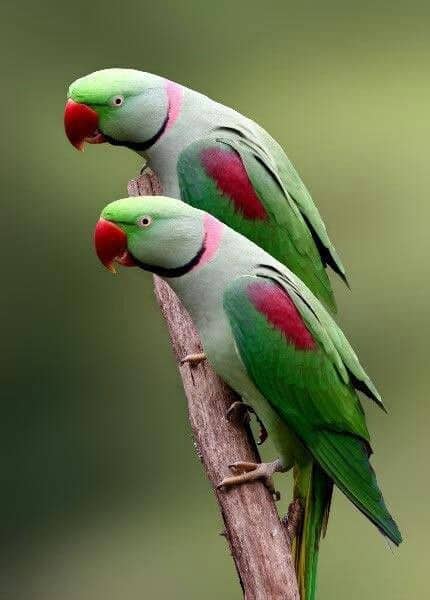
Anyway, about soybeans in diet calming Agni down. Is that a good idea? Thanks.
I read your blog every week and have learned a lot. Sure hope you keep it going.
mitchr replies
Yes, I would advocate eliminating the soybeans altogether.
Author Profile
Latest entries
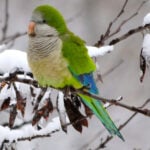 The Traveling BirdJune 26, 2025Can You Name 5 Parrot Species That Are Living Wild in the USA?
The Traveling BirdJune 26, 2025Can You Name 5 Parrot Species That Are Living Wild in the USA?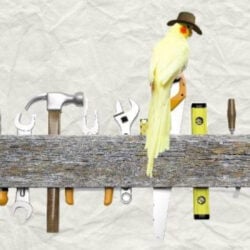 Bird BehaviorJune 26, 2025How is it Parrots Are Problem Solvers Social Animals and Even Use Tools?
Bird BehaviorJune 26, 2025How is it Parrots Are Problem Solvers Social Animals and Even Use Tools?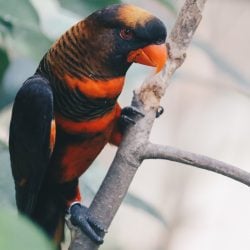 Bird & Parrot AnatomyJune 25, 2025How a Tiny Chemical Modification Makes Parrots Nature’s Living Paintings
Bird & Parrot AnatomyJune 25, 2025How a Tiny Chemical Modification Makes Parrots Nature’s Living Paintings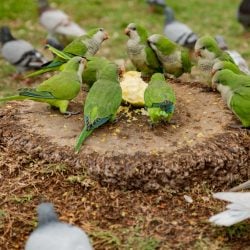 PigeonsJune 20, 2025How Do Parrots Thrive in Cities Outside Their Native Habitats?
PigeonsJune 20, 2025How Do Parrots Thrive in Cities Outside Their Native Habitats?

